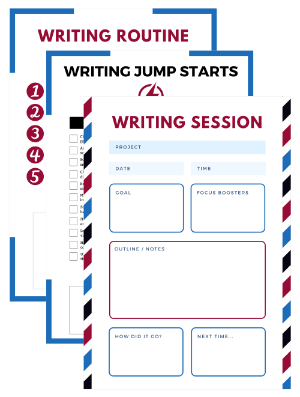Getting Out of Your Writing Slump: Part #2 – Re-entering the Writing Zone
 This post was originally published in June 2017 and updated in October 2020.
Last week, we looked at some of the practical things you can do to clear some space in your life for writing.
Simply having the time and energy to write, though, isn’t enough. You need the desire to write too … and that’s what today’s post is all about.
When you’ve not been writing for a while, you may feel unsure whether you even want to write. I felt this way back in mid-2008: I was exciting about making a living from freelance writing (I’d just left my day job) … but I was also about to start an MA degree in creative writing! I felt like I’d lost all interest in writing fiction.
Twelve years on (and with three novels and a novella out there) … you can probably guess I got out of that fiction slump. 😉
For me, the cure was – in retrospect – a bit obvious. I needed to start surrounding myself with fiction writers and with material on fiction writing again. From day one of my Masters course, that urge to write fiction was back!
Whatever type of writing you’re trying to get back into, here are some ways to re-find your passion for it:
This post was originally published in June 2017 and updated in October 2020.
Last week, we looked at some of the practical things you can do to clear some space in your life for writing.
Simply having the time and energy to write, though, isn’t enough. You need the desire to write too … and that’s what today’s post is all about.
When you’ve not been writing for a while, you may feel unsure whether you even want to write. I felt this way back in mid-2008: I was exciting about making a living from freelance writing (I’d just left my day job) … but I was also about to start an MA degree in creative writing! I felt like I’d lost all interest in writing fiction.
Twelve years on (and with three novels and a novella out there) … you can probably guess I got out of that fiction slump. 😉
For me, the cure was – in retrospect – a bit obvious. I needed to start surrounding myself with fiction writers and with material on fiction writing again. From day one of my Masters course, that urge to write fiction was back!
Whatever type of writing you’re trying to get back into, here are some ways to re-find your passion for it:
#1: Subscribe to Writing Blogs and Magazines
I’ve put this first because it’s simple and either free (blogs) or cheap (magazines). Simply reading about writing can be enough to get your head back into that writing zone.Recommended Blogs
With blogs, I’d strongly suggest taking a look at: Make a Living Writing – excellent, well-researched advice for freelancers Helping Writers Become Authors – fantastic advice for novelists Jeff Goins – for encouraging, motivational posts ProBlogger – lots of great advice for new and intermediate bloggers Smart Blogger – in-depth weekly posts on different aspects of writing/blogging/marketing The Write Life – all-round writing advice and encouragement, with a focus on non-fiction / freelancing Craft Your Content – great, thoughtful posts on various aspects of writingRecommended Magazines
Here in the UK, the main writing magazines are: Writing Magazine (monthly) – wide range of articles on all aspects of writing, covering non-fiction, fiction, and poetry; runs regular competitions (normally with a particular topic or starting line). Includes the market-focused Writers’ News. If you’re only going to get one magazine, this is the one I’d go for. Writers Forum (monthly) – articles are a bit more eclectic than Writing Magazine; you may (like me) feel that some of these work and some don’t! Overall, has a younger, more modern feel than Writing Magazine. Runs a rolling competition open to all genres and subject matter. Mslexia (quarterly) – for female writers; a slightly more literary approach than the others, and only available by subscription. More likely to cover political / sociological issues than the other magazines. Whatever blogs or magazines you subscribe to, do be aware of the danger of simply reading about writing without actually doing it. Once you start to feel a little spark of enthusiasm, stick with it and write something!#2: Consider Taking a Course
I found my masters degree invaluable … but I know that’s not a realistic option (practically and financially) for most writers, and an academic course isn’t the right route for everyone anyway. Wherever you live, there’s a good chance you can find a local writing course – or travel a short distance to one. That might be:- An evening class that takes place every week for a few months.
- A summer course in a nearby university city (here in the UK, Oxford University and Cambridge University both run creative writing courses).
- A residential writing course run by the Arvon foundation at one of their writing centres.
- A day course or half-day course run by a local writing tutor … or a local library.
- Winchester Writers’ Festival: long weekend, usually late June each year (ran virtually in 2020)
- Festival of Writing (York): long weekend, usually September each year (ran virtually in 2020)
- Swanwick Writers Summer School: week’s residential, usually mid-August each year (cancelled in 2020)
#3: Join (or Start!) a Writers’ Group
I’ve been in several different writers’ groups over the years (I joined my first aged 14). Every single one has been a brilliant source of encouragement and support … but also of crucial feedback on my writing. There are lots of different ways that writers’ groups run: some book guest speakers and have a fairly formal evening, others spend the whole time workshopping members’ writing, and others do writing exercises or get together to sit and write … so look around for something (or set up something!) that suits you. Many normally in-person writers’ groups are currently meeting on Zoom, or you could join an online group or forum devoted to writing. Now that I have young kids and a hectic schedule, I find that groups I can easily dip in and out of work well for me.#4: Try a Different Type of Writing
If you’ve been trying and failing to make headway with a particular sort of writing … maybe it’s time to try something new. That might sound a bit obvious, but I’ve known plenty of writers who stuck doggedly with one particular thing even though it wasn’t bringing them any enjoyment and (often) little other reward. For instance, if you’ve tried writing romance fiction because you think it’ll be easy and bring in money … but you never make it more than four chapters into the novel you’re writing … then perhaps you should switch to a different genre. If you’ve been trying to get established as a freelance writer, but your heart really isn’t in it, maybe you’d be better off finding a day job to make money while you write what you love to write on the side – even if that’s something fairly uncommercial, like poetry or memoir.#5: Set Aside Time on a Regular Basis to Write
I don’t believe that you need to write every day – though of course you can if that works well for you! What matters is that you write regularly. This could mean you write every Saturday morning for 3 hours then do no other writing all week: that’s fine! Block out time to write, even if it’s just half an hour a week to begin with. If you’ve not got a project to work on right now, or if you don’t feel ready to do so, you can use this time to “free write” about anything and everything that’s on your mind. Alternatively, you could use writing prompts or competition topics to spark off some ideas for short pieces. The point here is to flex your writing muscles and have fun with your writing. Every word you write is good practice – so don’t worry if you’re not producing anything “finished” at this point. If you’re in a slump and you haven’t been writing for some time, make a decision today: EITHER #1: Take some time deliberately “off” from writing, for a few weeks or a few months, and not feel guilty about it. OR #2: Look ahead over the next few weeks, decide when to “restart” your writing (maybe at the start of July, or on a particular weekend). Get other things in place – set up a good writing space in your home, for instance – to make it easy to get going again when your Restarting Day comes around. Would you like some extra writing inspiration? Check out Supercharge Your Writing Session and Supercharge Your Writing Week for help with getting focused and enjoying your writing more.
Supercharge Your Writing Session is designed to help you:
Would you like some extra writing inspiration? Check out Supercharge Your Writing Session and Supercharge Your Writing Week for help with getting focused and enjoying your writing more.
Supercharge Your Writing Session is designed to help you:
- Set aside time for writing sessions (even if you don’t have very long)
- Figure out the best time of day for you to write
- Get focused … and deal with distractions
- Figure out how much writing you should do each week
- Find ways to fit writing into your week
- Tackle problems if your week isn’t going smoothly
About

I’m Ali Luke, and I live in Leeds in the UK with my husband and two children.
Aliventures is where I help you master the art, craft and business of writing.
Start Here
If you're new, welcome! These posts are good ones to start with:
Can You Call Yourself a “Writer” if You’re Not Currently Writing?
The Three Stages of Editing (and Nine Handy Do-it-Yourself Tips)
My Novels

My contemporary fantasy trilogy is available from Amazon. The books follow on from one another, so read Lycopolis first.
You can buy them all from Amazon, or read them FREE in Kindle Unlimited.

I enjoyed your post, Ali. I am in the US, but am really encouraged by your blog. It is like a little voice nudging me to write more. Thanks! Cheyenne
http://www.happinessasabyproduct.com
Aw, thanks, Cheyenne! So glad you’re finding the blog encouraging. 🙂 If there’s ever a particular topic you’d like me to write about, just let me know!
I liked ❤ your article and blog, I’m following your blog. Thanks for writing the helpful stuff!
Yet another wonderful post!
A great comparative study!
Lot of confusion removed.
Keep sharing
Thanks for sharing.
Regards
acison
acison.com’s last blog post ..How many letters are there in the English Alphabet ?
This is really informative post. Thanks for sharing on this topic. I will subscribe your page for more updates.